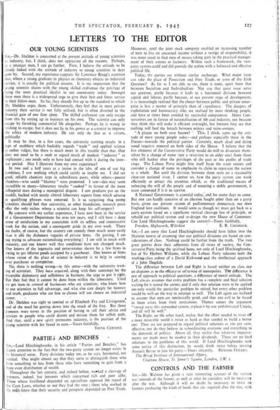CONTROLS AND THE FARMER
SIR,—Mr. Walston has given a very interesting account of the various war controls of the farmer, as well as what he considers will be necessary after the war. Although it will no doubt be necessary to insist on farmers producing the kinds of foods that are iequired after the war, with
which technical advice can be of considerable essistance, there is a distinct limit as to how far control can be justified. After all, farming is a business in which the farmer is spending his own money, and if he is, or thinks he is, being compelled to do an uneconomic thing on his farm, he is entitled to compensation. In any case, he will be disgruntled, which would not tend to encourage production.
Valuable as technical advice is, the most crying need in farming in the post-war period is for the proper organisation on a national scale of our marketing system, including the processing, grading, &c., with the minimum of superimposed costs between leaving the farm and getting to the consumer. This would naturally lead to control on the farm, but control which would be much more palatable.
Standards of quality of the different kinds of produce would be necessary and on which the farmer is paid when it leaves the farm. It is essential that these standards should be clear and understandable, and when attained by the farmer he should receive his proper reward. With a firm goal in view and an economic price, he will strive to attain it and will make full use of technical advisory help. Farmers can understand this method. It is a fine, healthy stimulus to them ; because unless they attain these grades they will be penalised through their pockets.
As long as a farmer delivers the goods required up to a reasonable standard he should be left alone as much as possible to continue his good work. It is only in those cases where a farmer fails to attain a reasonable standard that he needs special attention and advice, in which cases compulsion may be useful and necessary.—Yours faithfully,
Crowhamstone, Stone, Aylesbury. JOHN PORTER.
Sta,—In his articles on Agriculture Mr. Walston has it all his own way, for nowhere in your columns appears a single word from the farming community. It will not do. Mr. Walston states that the War Executive Committees are composed of representatives of the farming industry. That may be so, but let it be dearly stated that they do not represent the farmers: They are nominees of the Government and farmers had no voice or vote in their selection.
Mr. Walston stresses the importance of friendly relations between the Fields Advisory Officer and the farmer. It is suggested that this officer should continue to be linked with a Committee having powers of business "life and death" over the inslividual. To ask this man for advice would be like asking the chief hangman's assistant to dinner. You don't, even if you have only a moderate skeleton in the cupboard. On the other hand, if there is no skeleton, there is very little need for the hangman.
If the War Executive Committees are to continue and have the confidence of the farmers, it is not enough that the farming community should be represented, it must be seen to be represented. Secondly, any advisory service must be clearly divorced from any Committee with powers of eviction from home and homestead.—Yours obediently, E. S. HIGGS. "New House Farm," Clee St. Margarets, Craven Arms, Salop.























 Previous page
Previous page